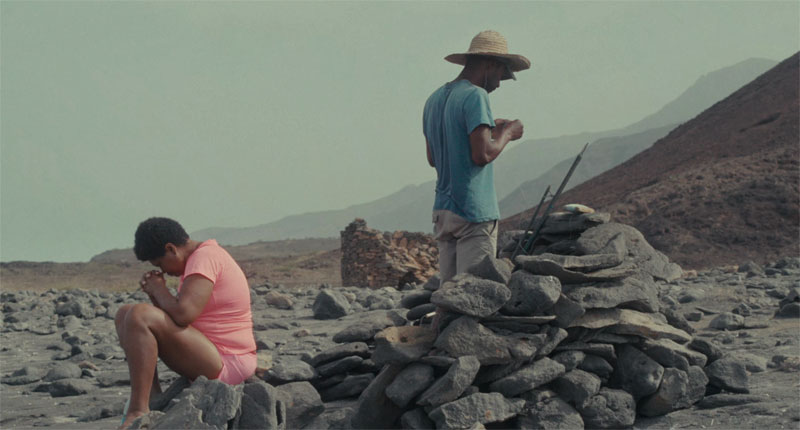Far West
-
Réalisé par Pierre-François Sauter • Écrit par Pierre-François Sauter
-
Suisse, Portugal • 2024 • 86 minutes • Couleur
- Réalisation :
Pierre-François Sauter - Écriture :
Pierre-François Sauter - Image :
Joakim Chardonnens, Pierre-François Sauter - Son :
David Medina - Montage :
Anja Bombelli - Mixage :
Hugo Leitão - Étalonnage :
Paulo Américo da Silva - Sound design :
Hugo Leitão
- Production (personne) :
Nadejda Magnenat - Production (structure) :
Le Laboratoire Central - Coproduction :
Terratreme Filmes - Participation :
FOC - Federal Office of Culture, Cinéforom , Loterie Romande, Suissimage - Ayant droit :
Le Laboratoire Central
- N° ISAN :
ISAN 0000-0005-04A3-0000-C-0000-0000-1
Résumé
"Ce sont deux mondes qui s'ignorent ou s'observent à distance. Celui d'Angela et Jair, un couple de pêcheur·euse·s parcourant pour se nourrir la côte volcanique giflée par l'océan. Et l'autre, opposé, des Blancs fortunés qui débarquent dans leur village comme sur une planète exotique pour pratiquer le "big-game fishing" popularisé par Hemingway. Car le Cap-Vert est mondialement connu pour être le "paradis" des marlins bleus. La parole est rare dans le nouveau film de Pierre-François Sauter (Calabria, VdR 2016), composé uniquement de plans fixes qui écoutent le silence observé par ses protagonistes dans le nu d'une vie frugale et immuable. Mais tout en adoptant le point de vue de Jair et Angela, le cinéaste suisse développe son récit en embarquant à la fin avec ceux qui traquent le "guépard des mers" et narrent bruyamment leurs exploits sur Facebook. Par ses choix formels, Far West montre politiquement l'irréductible inégalité des échanges entre le Nord et le Sud, en suggérant que la pêche sportive internationalisée n'est que la poursuite, par d'autres moyens, d'une entreprise prédatrice inaugurée avec la colonisation."
(Emmanuel Chicon - Visions du Réel)
Angela and Jair survive by fishing for food on the wave-beaten volcanic rocks. Their life as a couple is under stress and their existence is precarious. In their fishing village, which is being transformed into a touristic spot, they rub shoulders with Big Game Fishing enthusiasts who pay fortunes to enjoy themselves and prepare for the Blue Marlin World Cup by hunting the "cheetah of the seas".
"Two worlds, either ignoring each other's existence or watching each other from a distance. One is the world of Angela and Jair, a couple who survive by fishing for food on the wave-beaten volcanic rocks. The other, opposite world is that of wealthy white people, landing in their village as though it were an exotic planet, who have come to take part in the sport of "big-game fishing", as popularised by Hemingway - indeed, Cape Verde is renowned throughout the world as a "paradise" for blue marlins. There are few words in this new film by Pierre-François Sauter (Calabria, Vision du Réel 2016). Consisting only of static shots, we listen to the silence observed by the protagonists in the starkness of a simple and unchanging life. However, while adopting the perspective of Jair and Angela, the Swiss director adds a layer at the end of his film by embarking with the very people who are hunting the blue marlin and boasting of their exploits on Facebook. Through its formal choices, Far West demonstrates, from a political perspective, the unresolvable inequality of exchanges between the North and the South, suggesting that international sport fishing is nothing more than the pursuit, through other means, of a predatory venture which started with colonisation."
(Emmanuel Chicon - Visions du Réel)
Mot(s)-clé(s) thématique(s)
Sélections et distinctions
- 2024 • Visions du Réel • Nyon (Suisse) • Compétition Internationale Longs Métrages - Première mondiale
Comment avoir accès au film ?
-
Édition DVD
- Il n'existe pas d'édition DVD à notre connaissance
-
Accès VOD
- Il n'existe pas d'accès en VOD à notre connaissance
- Distribution
- Aide sur les moyens d'accéder à un film
